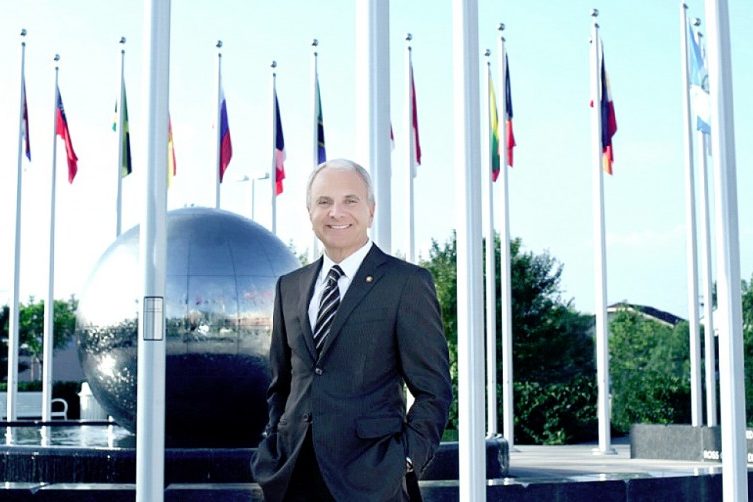Valeria Rumori took office as new director of the Italian Cultural Institute of Los Angeles a few months ago.
With a strong determination to build upon the legacy of her predecessor Alberto Di Mauro and his deputies Massimo Sarti and Michela Magrì, she has firmly grabbed the reins of many events yet and is constantly working to include more interesting initiatives in her program.
On the occasion of our first meeting, she kindly addressed the newspaper with words of appreciation: “Returning to California after 6 years, I was very glad to find L’Italo-Americano still alive and kicking. I used to collaborate with the newspaper during my previous mandate at the IIC of San Francisco, and I consider it as a benchmark in terms of constancy and professionalism. While similar initiatives elsewhere have failed, its work to preserve the Italian culture and language remains unchanged and praiseworthy.”
Dr. Rumori, can you please tell us more about your experience with the Italian Ministry of Foreign Affairs before coming to L.A.?
California is like home to me. My first mandate abroad with the Italian Government was at the IIC of San Francisco from 2003 to 2009, in the very heart of the Silicon Valley, where many brilliant Italian minds work. The local IIC used to cooperate with universities the likes of Berkeley and Stanford on a lot of interesting projects, relating not only to science and technology but also to cinema, art, and other fields of the Italian culture.
Compared to San Francisco, Los Angeles looks very different. Despite a strong multicultural flair, in my opinion, it is more vibrant in terms of academic and cultural opportunities. Of course, the strategic position of the IIC almost inside the UCLA campus represents a great asset, creating a natural connection with the University and its activities. The interest for the Italian culture is deep and genuine, as I can tell from the numerous offers of collaboration received during these first few months, and I’m very pleased to be here, helping promote the Italian culture in a country that I’m familiar with and sincerely appreciate.
After San Francisco, I was entrusted the direction of the IIC of Marseille, in southern France. The Italian community there is mainly made up of second-generation immigrants, who don’t speak the language and wish to reconnect with their parents’ origins. I worked closely with the local Consulate and Chamber of Commerce, but also with the Migration Museum and the bilingual magazine Radici, an original project developed by Rocco Femia.
Together, we organized a cultural tour of southern France dedicated to the history of Italian immigration, including a stage show. The promotion of the Italian language has always been a central goal in my job. While working at the Ministry’s headquarters in Rome, I focused on the internationalization of the Italian university for it to attract more foreign students, mainly from the U.S., by adapting the AP to the American high school programs. I was also involved in the selection of candidate students and professors for the Fulbright Commission.
As you certainly know, some Italian Cultural Institutes both in Europe and the U.S. have been recently closed, due to budget cuts. Do you think it makes sense to maintain these Institutions in the framework of a global and easier access to cultural information and, in particular, within the European Union?
The Marseille experience proved to me that the IIC still has a significant impact even in Europe. Besides offering classes of Italian language and culture, creating connections and arousing interest towards Italy both at a cultural and commercial level, the IIC becomes the main reference point in countries where the Italian Trade Agency and Tourism Board don’t have office. In addition, compared with school programs, the greatest potential of the IIC is its ability to show contemporary Italy that most people don’t know, for example now on the occasion of Expo Milan 2015. I understand the need to strengthen our cultural presence in emerging markets, but I don’t think we should lose it in the closer ones either.
So in the U.S., and particularly in Los Angeles, what is the best strategy to promote the Italian language and culture?
Certainly, we can rely on the fame of Italian classics, from Dante Alighieri – whose 750th anniversary will be soon celebrated – to the Renaissance, but equally important is to display different aspects of contemporary Italy, from art to literature, cinema, and even less explored sectors. The mission of the IIC is to promote these through cultural events that the public couldn’t find elsewhere, in collaboration with the Chamber of Commerce, the Consulate, and other Italian institutions, as well as with local organizations. For example, ISSNAF can become a strategic partner in science and technology, which aren’t yet as strong in L.A. as they are in San Francisco. It takes time to visit all the venues and speak to all the interlocutors, but I can really see a huge potential.
Should the IIC regulars expect any radical change or will you follow in your predecessors’ footsteps? And what is your plan to engage the younger generations more?
The activities carried out by the IIC of L.A. over the last few years have been appreciated and supported by many guests and friends. Therefore, my intention is to continue in the same direction, trying to identify the areas where there’s still room for improvement. A vast metropolis like Los Angeles and its jurisdiction make it quite difficult for the reduced IIC staff to manage all events going on, but we do our best thanks to a very good reputation and growing network.
As far as the young generations are concerned, I’d like to develop new initiatives in collaboration with schools and universities, such as book clubs or lectures on the Italian diet relating to Expo Milan 2015, in order to establish contacts with potential local users who are not familiar with Italy yet. We need to enter the academic world and reach our future audience.
If I may ask you a personal question, which is the aspect of the Italian culture that you love the most?
I’d say, cinema, and not only because of Los Angeles. In other cities as well, cinema is an incredible force of attraction and we must capitalize on it.



























